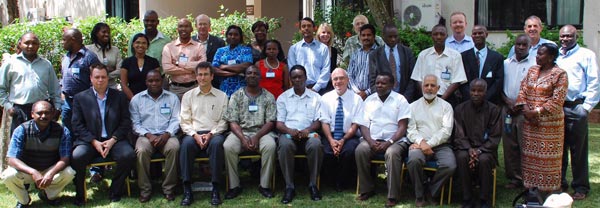On 17 February 2010 CIMMYT launched a new public- private collaborative project for improved food security in Africa. The initiative, known as Improved Maize for African Soils (IMAS), will spearhead the creation and sharing of new maize varieties that use fertilizer more efficiently and help smallholder farmers get higher yields, even where soils are poor and little commercial fertilizer is used. For this project, CIMMYT is partnering with the DuPont Business, Pioneer Hi-Bred; the Kenya Agricultural Research Institute (KARI); and the South African Agricultural Research Council (ARC). IMAS is funded with USD 19.5 million in grants from the Bill & Melinda Gates Foundation and the United States Agency for International Development (USAID).
The launch, which followed two days of IMAS stakeholder meetings, was held at the Serena Hotel in Kenya and attended by Nairobi media. The distinguished panel of speakers was headlined by KARI Director Ephraim Mukisira, and included Shadrack Moephuli, President and Chief Executive Officer, and Mohammed Jeenah, Executive Director for Research and Development, ARC; Lloyd Le Page, Senior Manager, Technology Acceptance and Sustainable Development, Pioneer Hi-Bred; and Marianne Bänziger and Wilfred Mwangi from CIMMYT. “Like many sub-Saharan African countries, Kenya must optimize the use of its soils for agriculture to increase food security, and do this while facing climate change, escalating input costs, and a deteriorating natural resource base,” Mukisira said, as he officially announced the project to the world. “The IMAS project will apply scientific innovations to provide long-term solutions for African farmers, developing maize varieties suited to Kenya’s diverse farming ecologies.”
The stakeholder meetings brought together some 50 participants from the previously-mentioned organizations. In addition to the high-quality technical and planning discussions, the impressive enthusiasm and project “buy-in” evident among partners pleased project leader Gary Atlin, associate director of CIMMYT’s Global Maize Program. “We will succeed, and we will have impact,” Atlin said, in a wrap-up session after the first day. Former CIMMYT maize physiologist and “father” of the center’s research on drought and low-nitrogen tolerance in maize, Greg Edmeades, took part as a special consultant.


